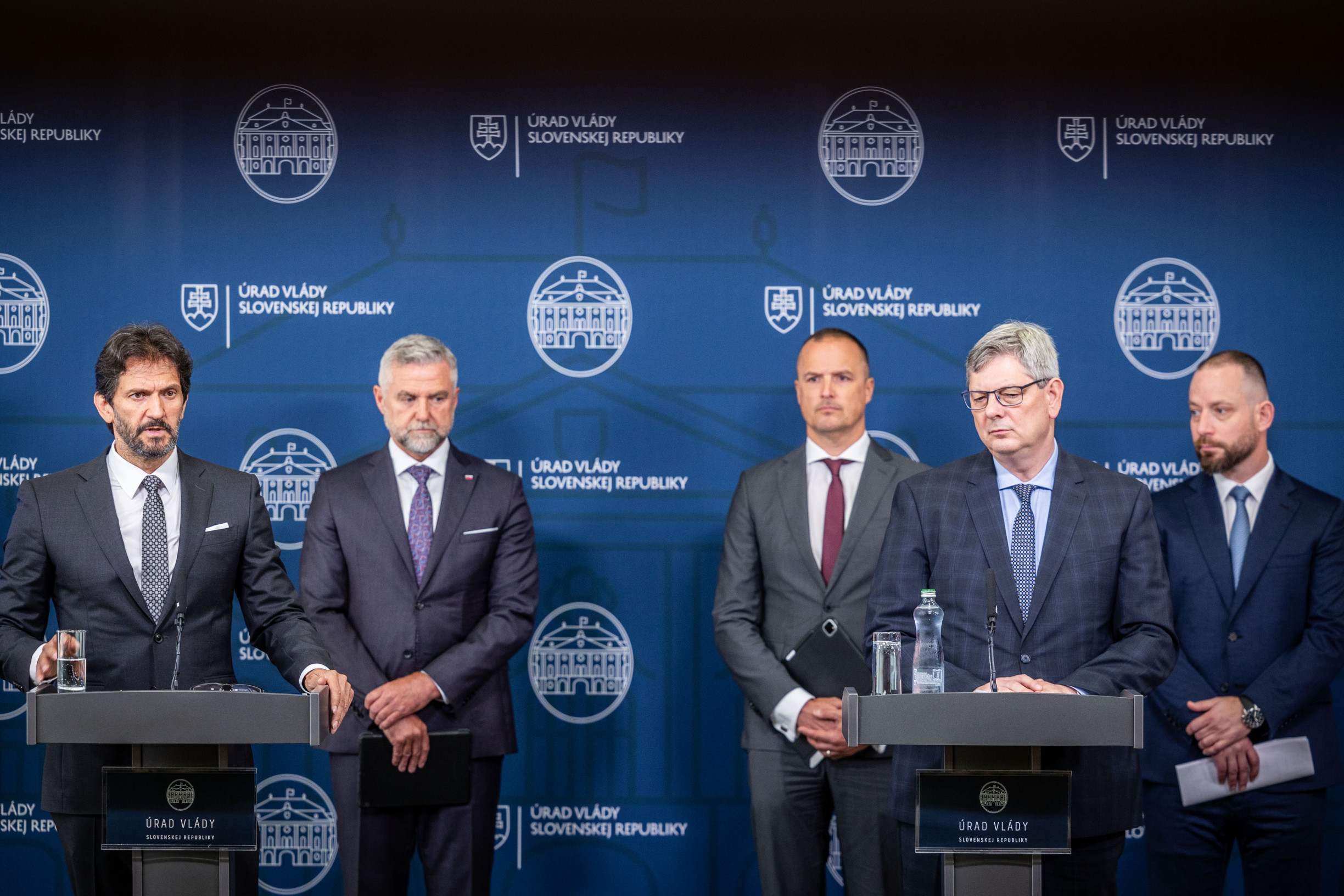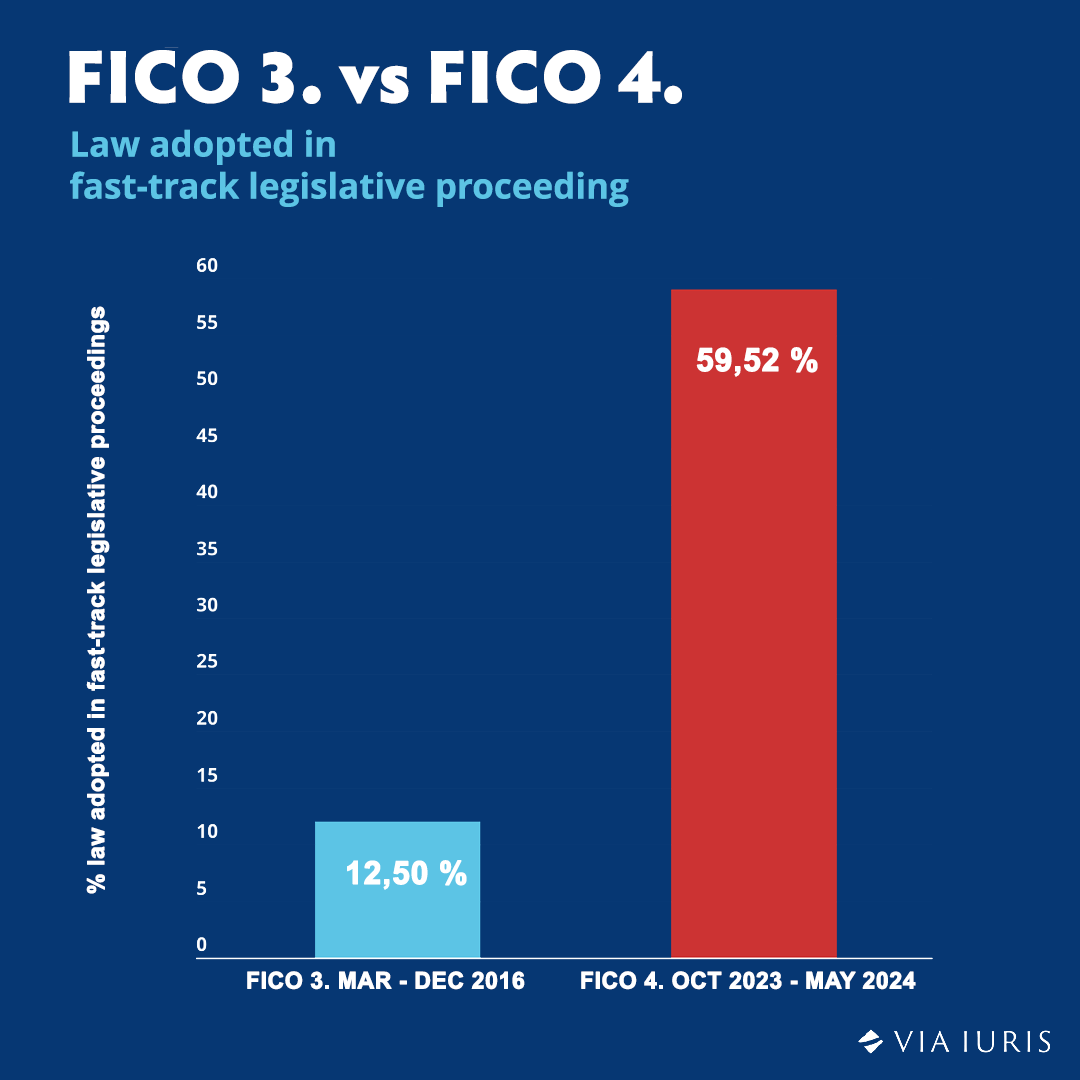Verbal attacks on judges continue (Zeitgeist 5.)
Another month, another series of legislative and political actions in Slovakia raising concerns over democratic principles and judicial independence. The parliament’s condemnation of an assassination attempt on Prime Minister Robert Fico started a series of proposals for limitations of fundamental rights and verbal attacks on judges by high-ranking officials, threatening judicial integrity.
Threats of disciplinary charges against Supreme Court judges also illustrate the judiciary’s politicization. The government has replaced the public broadcaster RTVS with a government-controlled entity, raising alarms over the media landscape. Further legislative changes propose restricting public access to information by introducing “limited information” and imposing fees for information requests, undermining transparency.
Under Fico’s government, fast-track lawmaking has bypassed democratic processes, omitting legislative quality. Fico’s post-assassination rhetoric blames the opposition, media and civic organisations for inciting violence, contributing to political instability. Additionally, Slovakia’s refusal to support new international health regulations has drawn international criticism, further distancing the country from global cooperative efforts.
Verbal attacks on judges continue
Recently, the parliament passed a resolution condemning the assassination attempt on Prime Minister Robert Fico, urging political entities to ease social tensions and contribute to unity and stability in Slovakia. However, just 13 days after this resolution, Vice-Chairman of the Slovak Parliament Ľuboš Blaha launched a verbal attack on a specialized criminal court judge, questioning her independence and criminalizing her role.
Reacting to this incident, the Judiciary Initiative for an Open Judiciary condemned the Vice-Chairman’s statements, emphasizing the importance of respecting and protecting the judiciary’s independence. Such assaults on judicial independence by government officials threaten individual judges and the entire judicial system, undermining the rule of law and respect for legal institutions. The ongoing public attacks on judges risk inciting dangerous actions against them and eroding Slovakia’s fundamental rule of law principles.
Minister of Justice files disciplinary charges against judges of the Supreme Court
Slovak Prime Minister Robert Fico initially suggested Supreme Court Judge Juraj Kliment should resign amid legal controversies. Around six weeks later, Justice Minister Boris Susko announced a disciplinary motion against Kliment, with support from Deputy Prime Minister Robert Kaliňák, accusing Kliment of human rights violations. The European Court of Human Rights, a key player in upholding justice, ruled that the rights of detained judge Denisa Cvikova were violated in 2020, leading to this disciplinary action. Cvikova had been implicated in a major corruption case.
Still, her complaint about her detention conditions was upheld in Strasbourg, eliciting criticism from government officials who want her €19,500 compensation paid by the individuals responsible. Susko and Kaliňák view the decision as proving systemic violations by Kliment’s judicial panel. Kliment argues the government’s actions are politically motivated attacks on judicial independence. He plans to appeal to European judicial bodies, opposing the disciplinary measures, asserting they represent undue political pressure on judges.

Minister of Justice Boris Susko (right) together with Minister of Defence Robert Kaliňák (left) announce the disciplinary charges
against a Supreme Court Judge, Juraj Kliment.
Behind the ministers are:
Member of Parliament, former President of the Police Force (at the time of the murder of Ján Kuciak) Tibor Gašpar – accused in one cases , indicted in two cases.
Adviser to the Prime Minister, former judge David Lindtner – accused in one case, indicted in one case.
Adviser to the Prime Minister, lawyer Marek Para – accused in one case. Source: kauzy.sk
The public broadcaster has been conquered
The Slovak Parliament approved a controversial reform to replace the public broadcaster RTVS with a new entity controlled by the government, leading RTVS director Ľuboš Machaj to resign. The reform, passed on June 20 by 78 deputies and its effective since July 1 after express signature of the new President, Peter Pellegrini. Opposition parties, protesting the decision, exited the Chamber before the vote.
The new broadcaster, Slovak Television and Radio (STVR), will be governed by a board of directors directly appointed by the government. International organizations, including the European Federation of Journalists, have expressed alarm over the potential politicization and loss of media independence. Despite some amendments, the law still faces criticism for undermining editorial independence and contradicting European media freedom laws. Opposition leader Michal Šimečka vowed to challenge the law in the Constitutional Court.
Access to information endangered
The Ministry of Interior, in its proposal of the Critical Infrastructure Law, indirectly amends the Law on the Protection of Classified Information, introducing a new term – “limited information,” effectively restricting the public’s right to information. State authorities can classify any information as “limited information,” bypassing the Free Access to Information Act. This amendment could empower state officials to decide which information remains restricted, potentially undermining citizens’ access to critical information. The broad definition of “limited information” allows for arbitrary interpretation, raising concerns about arbitrary information classification by state agencies. Additionally, the proposal includes the ability to keep lists of what constitutes “limited information” confidential, further limiting transparency and public oversight. In conjunction with other legislative changes that propose fees for information requests, this proposal significantly threatens transparency and public access to information. Advocacy groups are urging support for a collective input to challenge this constitutionally controversial law amendment. They advocate for the removal or stringent revision of the concept of “limited information” to ensure only essential details related to critical infrastructure are shielded, preventing authorities from broad discretionary application.
In addition, the nationalist party seeks to restrict citizens’ fundamental right to information by proposing fees for handling information requests currently accessible for free. The proposed legislative changes could introduce charges for receiving non-confidential information from state authorities, limiting access based on financial means. Without clear definitions or guidelines, the proposal raises concerns about the discretion officials may wield in deciding which information warrants “extensive searches” and becomes subject to fees, effectively creating a paywall for critical information. The bill’s lack of transparency and accountability opens avenues for authorities to selectively impede access to information, potentially hindering journalists, organizations, or political opponents from obtaining crucial data. By mirroring a flawed Czech model of information accessibility fees, the proposal risks granting unprecedented authority to state bodies, threatening democracy by curbing public access to vital information.
Most of the law is adopted in fast-track legislative proceedings
Laws are being approved without discussion, even worse than during the pandemic, as the fourth government of Robert Fico is passing nearly 60% of laws through fast-track legislative proceedings with no apparent justification. This significant increase in expedited laws indicates today’s coalition’s lack of respect for democratic lawmaking processes, prioritizing authoritarian decisions over quality expert debate.
The rush in passing laws often leads to significant errors, necessitating corrections during parliamentary readings, diverging from the intended purpose of minor technical reviews. The expedited laws have limited public engagement, reducing the opportunity for legal experts, organizations, and the public to provide input and compromising legislation’s quality, clarity, and comprehensibility. The trend of sidelining comprehensive expert discussions poses risks to the quality of laws and legal certainty, ultimately restricting citizens’ rights without thorough consideration and input.

Prime Minister threatens parliamentary opposition, media, and civil society organizations
Prime Minister Robert Fico, recovering from a shooting attack in May, released a video blaming parliamentary opposition, media, and civil society organizations for the assassination attempt, describing the attacker as an opposition activist driven by political hatred. Fico forgave the attacker and pledged not to take legal action against him. He also mentioned his severe health complications from the shooting but provided limited details. In the video, Fico accused anti-government media financed by George Soros, foreign funded NGOs, and the opposition for the attack, warning of further tragedies if aggressive politics continue unchecked. He criticized the EU and Western allies, highlighting differences in opinions and claiming a lack of respect for Slovakia’s sovereignty. Fico predicted more violent incidents if the opposition and international parties did not alter their approaches, downplaying threats from opposition figures. The video helped SMER-SD to exploit the situation before the European Parliament election.
Slovakia did not support the pandemic treaty
Slovakia has chosen to distance itself from the new amendments to the International Health Regulations (IHR), a decision that sets it apart globally. These amendments, aimed at preventing the international spread of diseases and improving pandemic response, were supported by over 190 countries but met with surprise from Slovakia. The Health Ministry, led by Zuzana Dolinková, cited insufficient time for the decision and highlighted potential delays in accessing crucial health information and vaccines. Despite global support for the amendments, Slovak MP Peter Kotlár, known for anti-vaccine views, represented the country, causing significant international criticism and being labeled a major embarrassment by Slovak health experts and professional associations. Minister Dolinková announced plans to enhance an interdepartmental working group to evaluate the updated WHO documents amid growing concerns about the risks posed by Slovakia’s dissociation.
New president in the office
Former Prime Minister Robert Fico’s ally, Peter Pellegrini, was inaugurated as the new Slovak president on Saturday, June 15th. This inauguration differed from previous ones due to security concerns, which prevented the president from interacting with the public closely. The event hosted various dignitaries, including former presidents, government officials, and diplomatic corps members. Notable attendees included Czech politician Zeman and controversial figure Babiš.
Assassination Law limits fundamental rights
Following the assassination attempt on Prime Minister Robert Fico, the government approved changes known as the ‘lex atentát’ (assassination law), which brought restrictions on public gatherings and introduced new benefits for government officials. The proposal, including a lifetime pension of €3,192 per month for Fico, fast-tracked through parliament with limited scrutiny. Fico will be the first Slovak prime minister to receive such benefits, with specific eligibility criteria that only he fulfils. The law also extends security entitlements to various political figures, including the president, prime minister, and ministers. Furthermore, there are restrictions on public gatherings near key governmental institutions to ensure smooth functioning without disturbances.
Protests near designated officials’ residences will be limited to maintain order and prevent disruptions. Concerns persist regarding the rushed and poorly drafted laws, lacking professional debates before being presented to parliament. Proposed amendments to the legislation include dropping penalties for municipalities hosting gatherings resulting in incidents, avoiding imprisonment for unpaid administrative fines, and the obligation for operators to share user metadata with the police for offensive online expression. The exclusion of key stakeholders and entities from contributing to crucial legislative discussions has led to poorly written drafts requiring last-minute revisions, diminishing the opportunity for public input or professional scrutiny. Critics highlight the danger of restricting expert discourse on laws that impact everyone, leading to flawed legislation and a limited channel for dissent beyond the streets in this peculiar interpretation of democracy.
About Zeitgeist
Zeitgeist is the English newsletter of VIA IURIS, in which we try to capture the zeitgeist of the political situation in Slovakia, which has changed dramatically after the parliamentary elections in September 2023.
The 4th government of Prime Minister Robert Fico was formed by a coalition of two, as they call themselves, social democratic parties – SMER-SD, HLAS-SD and the nationalist party SNS. Since the coalition was formed, institutions guaranteeing the rule of law and public control, including Slovak civil society, have been under constant attack.
Previous issues of our English newsletter can be found here
Topics: #RuleOfLaw #legislation #media #CivilSociety

